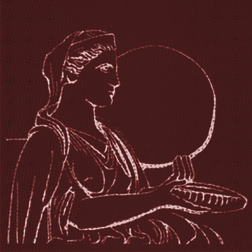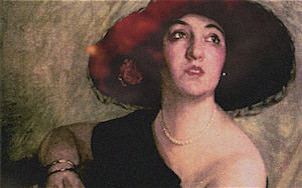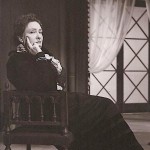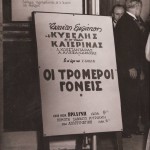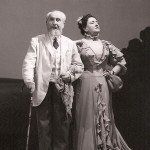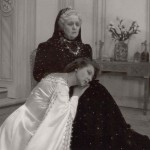To cope with her personal ordeals Kyveli sought refuge in her natural habitat, the theatre. Her great return, at the age of 62, occurred in the summer of 1950. The Kotopouli Company was preparing the French comedy Les Enfants d’ Edouard by Melville and Sauvajeon with Kotopouli as the star. However Marika urged Kyveli to return to the stage and she accepted by making a last minute appearance in the role of Mother Denise.
In 1951 Kyveli began working with the “National Theatre”, making appearances throughout the decade while also occasionally appearing with other companies. Her last period on stage was marked by her part as Contessa Valeraina. Kyveli played the Mother in Lorca’s Bodas de Sangre {Blood Wedding-which she also directed (1963)}, Lambrini Kiriakouli in Sto Nisi tis Afroditis (On Venus’ Island) by Alexis Parnis and directed by Solomos, the Empress Maria Feodorevna in Anastasie by Maurette and Bolton as well as the title role in Doña Clarines which was played along with Mañana de Sol (A Sunny Morning), written by Serafin and Joaquin Quintero (1966).
Kyveli made many audacious choices in her collaborations with the free companies. In 1951 in the only Aristophanean role of her career, she interpreted Lysistrata with Linos Karzis’ “Thimelikos Thiasos” at the “Odeon of Herodes Atticus”. The following year she collaborated with Katerina’s theatre company in Jean Cocteau’s Parents Terribles.
In 1953 she was with the Lambeti-Pappa-Horn theatre company in Oscar Wilde’s A Woman of No Importance directed by Michalis Kakoyiannis as well as in the police drama Kind Lady by Chodorov (Mary Norris) in which she appeared on stage with Manos Katrakis. Finally, in 1958 she dared play a role in complete contrast to her previous thespian experiences in Brecht’s Mutter Courage und Ihre Kinder (Mother Courage and her Children) under the direction of Takis Mouzenidis in her daughter Aliki’s troupe who played Katerina.
In 1967 the “National Theatre” repeated The Secret of Contessa Valeraina, which was also presented in Cyprus at the inauguration of “Nicosia’s Municipal Theatre”. That was the last time the stage lights shone on Kyveli. The following year (1968) Georgios Papandreou died.
When the dictatorship asked permission to provide for a state funeral, Kyveli refused and undertook a family funeral at her own expense. The procession of Papandreou’s coffin caused the first popular condemnation of the military Junta.
And then came the years of silence. Life came to an end in 1978. The last of the great stars of 20th-century Greece died leaving behind four children, three grandchildren, six great grandchildren and five great-great grandchildren.
